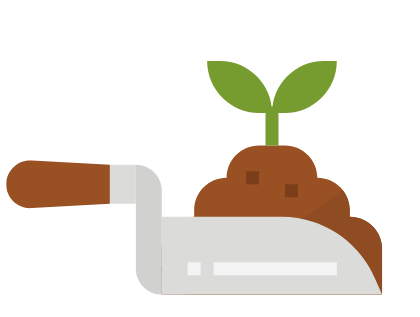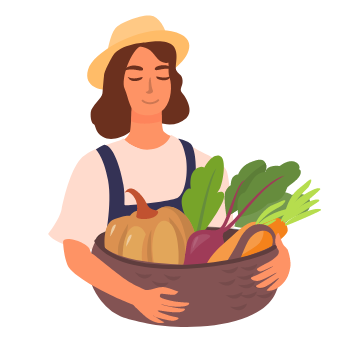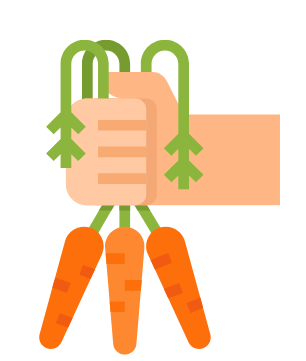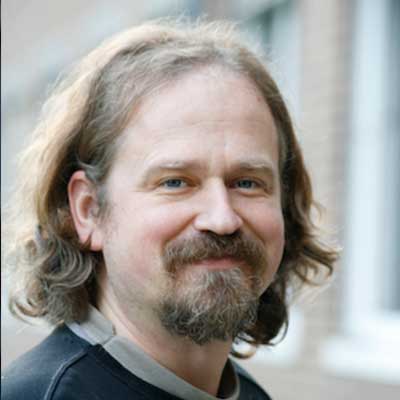Germany
Regional circular economy network for soil health
The testing ground (TG) aims to transform agriculture towards more sustainable practices through regional cooperation fostering a circular economy for improved soil health, climate change mitigation and bioenergy production. Several dairy farms and a biogas plant are involved in this testing ground. In addition, the cooperative establishes a service providing company (‘environmental station’) that will be responsible for the compost production and distribution to participating farmers. The TG is located in the far north of Germany in Schleswig-Holstein (near Flensburg). The region is a traditional dairy producing area with comparatively high stocking densities of dairy cattle in the Schleswig-Holstein Geest and Marsh and a high proportion of grassland, especially in the Marsh[1].
Cow manure as well as crop residues are to be used as a substitute for maize in the biogas plant for energy production. The digestate produced by the biogas plant is then composted and spread on the fields of the TG farmers. Also biochar from the TG region may be added to the compost. The treatment is expected to increase long-term soil fertility and to reduce the use of synthetic fertilizers.
In this way, the TG is creating a regional network that addresses multiple aspects of soil health and climate change mitigation through multiple levers. The aim is not only to find a way to create financial value to support the activities of the TG, but also to create non-monetary value for the participants in the network, such as appreciation for the ecosystem services they provide, enhanced social acceptance and attachment to the region.
[1] https://atlas.thuenen.de/webspace/agraratlas/agraratlas/index.html?LP=3


Relevance
The TG is embedded in the local and regional relevance of a circular system addressing soil and nutrient management issues building on existing networks. The concept aims to counteract the loss of humus by adding organic matter, thus maintaining soil fertility and the carbon storage function of the soil. At the same time, the use of manure digestate in compost addresses the emission problems associated with the storage and application of manure and the land-intensive use of energy crops in the biogas sector. The traditionally high density of dairy cattle can be reduced to better meet the needs of a more sustainable system.

Actors
Local actors with complementary roles and expertise are highly motivated to engage in the testing ground. An agricultural service provider, dairy farmers, a biogas plant and a pyrolysis unit for the production of biochar are already involved. The network will also establish a so called ‘environmental station’, where compost will be produced from the biogas plant’s digestate and distributed to participating farmers. In addition to the core TG group (farms, biogas plant, environmental station, biochar producer) other stakeholders are interested in the TGs approach and will be involved in the Community of Practice.

Farmer involvement
Farmers in the region will be at the center of the circular network. Farmers act as a link to close the regional cycle by providing crop residues and manure to the biogas plant as well as by using the compost produced for the enhancement of soil fertility and health.

Who is rewarded?
Farmers, that are at the same time biogas plant operators, and agricultural service providers will be rewarded by opening up new revenue streams, reducing costs and generating non-monetary benefits. Cost reductions may be achievable through lower storage costs for farmers and reduced use of synthetic fertilizers and other inputs. Non-monetary benefits are also expected, such as increased social appreciation of agricultural practices through public relations and embeddedness in the region.

Resources
The TG builds on a well-established network of innovative and open-minded participants who share similar values regarding sustainable agriculture and regional circular economy. Farmers are the land managers and basic infrastructure and equipment are available to set up the TG.

Marie von Meyer-Höfer
Researcher
marie.vonmeyer@thuenen.de

Gerald Schwarz
Researcher
gerald.schwarz@thuenen.de
SIGN UP TO OUR NEWSLETTER!
Contact
Get in touch with us by sending an e-mail to info.soilvalues@kuleuven.be

